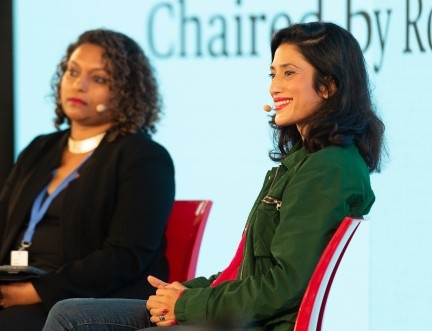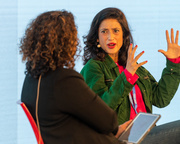More articles Sunday 11 August 2019 12:31pm
“Radicalisation is underpinned by raging inequality, anger and impotence” says Fatima Bhutto

“The underpinnings of radicalisation are not what we’ve been told over the past 20 years”, said Fatima Bhutto on the opening day of Edinburgh International Book Festival. She argued that religious beliefs are not, in fact, the driving force behind violent terrorism, but instead these are based in feelings of “raging inequality, anger, impotence and humiliation”. The Pakistani writer spoke with Indian author Roanna Gonsalves about her new book The Runaways which tells a powerful story between London and Karachi's biggest slum.
Bhutto argued that when your “country, society, community denies you a space to create your place in the world, your place in the future, then you’re vulnerable to anybody who offers you that space”. There are banal reasons for leaving to join a terrorist organisation such as inclusion and she linked these to social media and millennials’ increased desire to be the ‘centre of everything’. “There is a profound loneliness in how we live in the modern world,” she says.
Bhutto’s second novel explores the lives of several young people facing both that modern world, and the possibility of radicalisation. She explains where the appeal can lie: “Part of what is so seductive about these radical groups, is that they approach young and disposed people by saying, you don’t have a place there, we’ll give you a place. And that place will not only be open, and you will not only be free there, but you will be part.”
And this is true also, Bhutto said, of Neo-Nazis: “They feel part of a world that no longer includes them”. She prefers to use the term Neo-Nazi than “white nationalist” or “white supremacist”. Let’s call them what they are, not supreme, she insisted. “Supreme is a good word, because of Diana Ross mainly.”
Although the radicalisation of people going to ISIS and those becoming Neo-Nazis follow very similar patterns, Bhutto pointed out that the response to these variations of terrorism differ dramatically. We don’t know the name of the Christchurch Neo-Nazi attacker, but we do know the perpetrator of the Pulse nightclub shooting, who is Muslim. She drew a comparison with the so-called “ISIS bride” Shamima Begum, whose story has parallels with the characters in her novel. Around the same time as Begum was undergoing public scrutiny while in a refugee camp, Jack Letts, or “Jihadi Jack”, a white British-Canadian ISIS fighter, also expressed a desire to return to the UK. Begum was stripped of her British nationality, Letts was not.
This is partly because, Bhutto claimed, white people are allowed to be innocent in a way people of colour are not. She pointed to a Daily Mail cover picture of the Christchurch attacker as a child. “I’ve never seen Osama bin Laden’s baby photos.”
So, what do we do in response to violent terrorism? Bhutto agreed with “starving them of oxygen” – not publishing names, pictures, or words of the perpetrators of attacks, but argued it must be implemented across the board, regardless of the brand of terrorism. Yet she acknowledged that is very hard to achieve in the age we live in. She found the El Paso shooter’s manifesto “within two seconds” she said, “but the thing that we’re leaving out of that, is that there are world leaders propagating his ideas. So, we’ll hide his manifesto but what do we do with Trump’s tweets?”
When it comes to deradicalisation, Bhutto believes it must be done with compassion, and people need to be given the space which they have been denied. “You’re not going to deradicalise them by giving them less space… The solution is to not to push them further but to bring them closer.” That doesn’t mean they get welcomed back with a parade, she said: “They absolutely have to be accountable; people have to answer for any crimes they commit. [But] I think the harder question is what do you do in a society that is so thoroughly subjected to violence, that have people who are running away to fight in these disparate terror groups but you only have a country that’s been at war for 18 years, and you have young men coming back from Afghanistan and Iraq completely traumatised. How do you rehabilitate those men? The answers are connected really, you create space for people, you create more space to hear people.”


 Major new partnership with Celtic Connections
Major new partnership with Celtic Connections 

